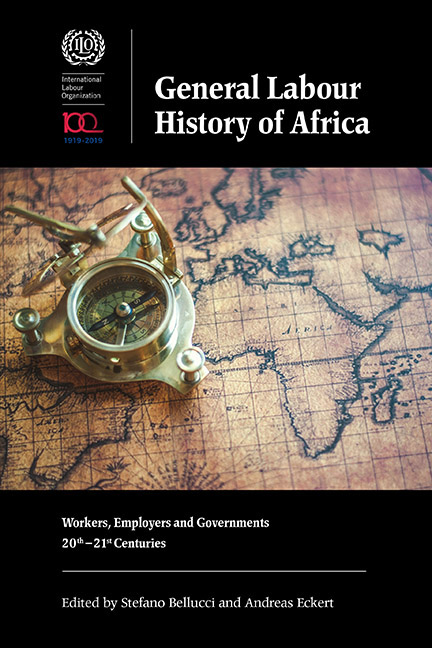Book contents
- Frontmatter
- Contents
- List of Maps and Figures
- List of Tables
- Notes on Contributors
- Foreword
- Acknowledgements
- The ‘Labour Question’ in Africanist Historiography
- Part I Free and Unfree Labour
- Part II Key Sectors
- Part III International Dimensions and Mobility
- Part IV Varieties of Work
- Part V Entrepreneurs and Self-Employment
- 15 Capitalists and Labour in Africa
- 16 Entrepreneurial Labour
- 17 Professionals and Executives
- Part VI The State, Unions and Welfare
- Part VII Conclusions
- Select Bibliography
- Index
16 - Entrepreneurial Labour
from Part V - Entrepreneurs and Self-Employment
Published online by Cambridge University Press: 21 September 2019
- Frontmatter
- Contents
- List of Maps and Figures
- List of Tables
- Notes on Contributors
- Foreword
- Acknowledgements
- The ‘Labour Question’ in Africanist Historiography
- Part I Free and Unfree Labour
- Part II Key Sectors
- Part III International Dimensions and Mobility
- Part IV Varieties of Work
- Part V Entrepreneurs and Self-Employment
- 15 Capitalists and Labour in Africa
- 16 Entrepreneurial Labour
- 17 Professionals and Executives
- Part VI The State, Unions and Welfare
- Part VII Conclusions
- Select Bibliography
- Index
Summary
Entrepreneurship – defined here as the process of managing, and often launching, an income-generating entity – is often depicted as a combination of personal attributes that enable certain individuals to perceive and act on economic opportunities more quickly and effectively than others do, and economic conditions in which economic opportunities are abundant and widely accessible. The present chapter seeks to shift the focus from innovation and individual ability to entrepreneurship as a form of work – as Austin points out in Chapter 16, most capitalists are entrepreneurs, but not all entrepreneurs are capitalists. In Africa, many who launch and manage productive enterprises operate too close to the margin to accumulate even small amounts of capital.
In sub-Saharan Africa, where small and medium-sized enterprises have greatly outnumbered large ones throughout the twentieth and early twentyfirst centuries, proprietors often work alongside their assistants (employees, apprentices, clients, unpaid family members), gathering information about market conditions and methods of production, negotiating prices and delivering goods to market. Entrepreneurs also engage in what might be called ‘social work’ – creating and managing relationships with a variety of other people (customers, creditors, employees, authorities) to gain access to markets and resources, direct and coordinate processes of production, and keep the enterprise going in good times and bad.
After outlining major shifts in economic and political contexts for entrepreneurial endeavour in Africa since the late nineteenth century, this chapter takes a closer look at entrepreneurial social work, placing it in the literature on entrepreneurship in twentieth-century Africa, then presents a few examples from my own research in Nigeria and Ghana to illustrate variations in entrepreneurial labour that have taken place at different times and locations. Approaching entrepreneurship as a social process rather than a collection of personal attributes, I argue that, while forms of social work vary across space and time, all entrepreneurial endeavour involves managing and sustaining social relations. Like relationships with co-workers, neighbours, etc., family relationships involve ongoing exchanges of material goods, attention and affect.
HISTORICAL OVERVIEW
Throughout the twentieth century, African economies were dominated by small-scale enterprises, many of them run by a single proprietor with the assistance of a few other people.
- Type
- Chapter
- Information
- General Labour History of AfricaWorkers, Employers and Governments, 20th-21st Centuries, pp. 457 - 474Publisher: Boydell & BrewerPrint publication year: 2019
- 1
- Cited by

